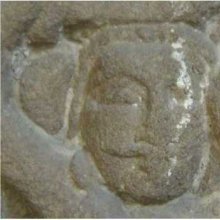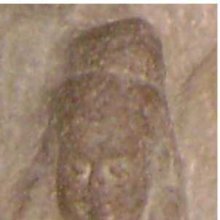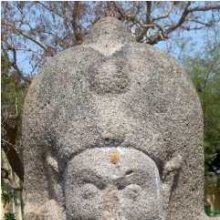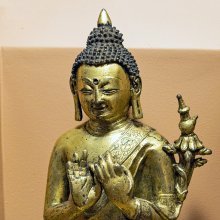Do: 8 definitions
Introduction:
Do means something in Hinduism, Sanskrit, Jainism, Prakrit, Hindi, biology. If you want to know the exact meaning, history, etymology or English translation of this term then check out the descriptions on this page. Add your comment or reference to a book if you want to contribute to this summary article.
Images (photo gallery)
(+71 more images available)
Biology (plants and animals)
Source: Google Books: CRC World Dictionary (Regional names)1) Do in Burkina Faso is the name of a plant defined with Aframomum exscapum in various botanical sources. This page contains potential references in Ayurveda, modern medicine, and other folk traditions or local practices It has the synonym Amomum granum-paradisi L. (among others).
2) Do is also identified with Tapinanthus bangwensis It has the synonym Loranthus talbotiorum Sprague (etc.).
3) Do in Cameroon is also identified with Albizia ferruginea It has the synonym Inga malacophylla A. Rich. (etc.).
4) Do in Congo is also identified with Cordia platythyrsa It has the synonym Cordia platythyrsa A. Chev..
5) Do in India is also identified with Aconitum balfourii It has the synonym Caltha codua Buch.-Ham. (etc.).
Example references for further research on medicinal uses or toxicity (see latin names for full list):
· London Journal of Botany (1844)
· Kongel. Danske Vidensk. Selsk. Naturvidensk. Math. Afh. (1828)
· Enumeratio Stirpium Plerarumque, quae sponte crescunt in agro Vindobonensi (1762)
· Exploration Botanique de l’Afrique Occidentale Française (1920)
· The Gardeners Dictionary (1754)
· Forest Ecology and Management (1989)
If you are looking for specific details regarding Do, for example diet and recipes, pregnancy safety, health benefits, side effects, extract dosage, chemical composition, have a look at these references.

This sections includes definitions from the five kingdoms of living things: Animals, Plants, Fungi, Protists and Monera. It will include both the official binomial nomenclature (scientific names usually in Latin) as well as regional spellings and variants.
Languages of India and abroad
Sanskrit dictionary
Source: DDSA: The practical Sanskrit-English dictionaryDo (दो).—4 P. (dyati, dita; -caus. dāpayati; -desid. ditsati)
1) To cut, divide.
2) To mow, reap. -With अव (ava) to cut or lop off; यदन्यस्मिन् यज्ञे स्रुच्यवद्यति (yadanyasmin yajñe srucyavadyati) Śat. Br.
Source: Cologne Digital Sanskrit Dictionaries: Shabda-Sagara Sanskrit-English DictionaryDo (दो).—r. 4th cl. (dyati) To cut, to divide: ava is usually prefixed.
Source: Cologne Digital Sanskrit Dictionaries: Benfey Sanskrit-English DictionaryDo (दो).—see 2. dā.
Source: Cologne Digital Sanskrit Dictionaries: Monier-Williams Sanskrit-English DictionaryDo (दो):—[class] 2. 4. [Parasmaipada] dāti, [Ṛg-veda] etc.;—dyati, [Atharva-veda] etc. ([perfect tense] 3 [plural] [Ātmanepada] -dadire, [Śatapatha-brāhmaṇa iii, 4, 2, 5]; [Aorist] adāsīt and adāt, [Pāṇini 2-4, 78]; Prec. deyāt, [vi, 4, 67]; dāyāt, [Kāṭhaka]; -diṣīya, [Ṛg-veda]; cf. ava-√do)
—to cut, divide, reap, mow, [Ṛg-veda; Atharva-veda; Śatapatha-brāhmaṇa] etc.:—[Passive voice] dīyate, [probably] to be cast down or, dejected, [Bhojaprabandha; Rājataraṅgiṇī] :—[Desiderative] ditsati, [Pāṇini 7-4, 54] :—[Intensive] dedīyate, [vi, 4, 66] (cf. √day and 3. dā).
Source: Cologne Digital Sanskrit Dictionaries: Yates Sanskrit-English DictionaryDo (दो):—(ya) dyati 4. a. To cut.
Sanskrit, also spelled संस्कृतम् (saṃskṛtam), is an ancient language of India commonly seen as the grandmother of the Indo-European language family (even English!). Closely allied with Prakrit and Pali, Sanskrit is more exhaustive in both grammar and terms and has the most extensive collection of literature in the world, greatly surpassing its sister-languages Greek and Latin.
Hindi dictionary
Source: DDSA: A practical Hindi-English dictionaryDo (दो):—(a) two; (nm) the number two; (for compounds also see [du~); ~amalī] diarchy; dual administration; ~[āba, ~ābā] doab, a tract of country lying between two rivers; the territory lying between the rivers [gaṃgā] and [yamunā; ~eka] one or two, a few; ~[galā] a bastard, crossbred; illegitimate; -[cāra] a few, several; -[ṭūka] decisive, categorical, crystal clear (statement, talk, etc.); •[phaisalā karanā] the door must either be shut or open; to arrive at a conclusive decision; ~[pahara] midday; noon; ~[paharī] midday, noon; ~[phasalī] yielding two crops a year; [muṃhā] see [du (~muṃhā); ~rukhā] double-faced; having two faces or aspects; ~[sālā] biennial, of two years; —[kī cāra sunānā] to pay in the same coin along with interest; —[kauḍī kā] worth nothing, inconsequential; —[ghoḍoṃ para savārī karanā] to ride two horses at a time; -[cāra] a few; •[honā] to be confronted with; -[do hātha karanā] to try out comparative strength; —[dina kā] of recent origin, comparatively young or new; transitory; —[dina kā mehamāna] one whose days are numbered, with a short lease of life;—-[mullāoṃ meṃ murgī harāma] too many cooks spoil the broth; —[nāvoṃ para paira rakhanā] to ride two horses at a time; —[roṭī kamānā] to earn one’s livelihood, to make both ends meet; —[śabda] a few words; —[sira honā] to be ready to face death; to invite one’s doom, to tread the path of sure doom.
...
Prakrit-English dictionary
Source: DDSA: Paia-sadda-mahannavo; a comprehensive Prakrit Hindi dictionary1) Do (दो) in the Prakrit language is related to the Sanskrit word: Dvidhā.
2) Do (दो) also relates to the Sanskrit word: Dvi.
3) Do (दो) also relates to the Sanskrit word: Dos.
Prakrit is an ancient language closely associated with both Pali and Sanskrit. Jain literature is often composed in this language or sub-dialects, such as the Agamas and their commentaries which are written in Ardhamagadhi and Maharashtri Prakrit. The earliest extant texts can be dated to as early as the 4th century BCE although core portions might be older.
See also (Relevant definitions)
Starts with (+2467): Do ho, Do ka, Do mai ruu lom, Do Takyanem Dhada, Do trong, Do-gani, Do-na-i-me-tog, Do-patti-lata, Do-sir-tasad, Doab, Doaga, Doah di, Doai, Doasc, Doast, Doaxn kieesm dor, Dob, Doba, Doba-tiga, Dobada.
Ends with (+856): A-nekedo, A-nekodo, Aafuscdo, Aagbado, Aagijaado, Aakdo, Aashcharyalagdo, Abado, Abamodo, Abhido, Abo dodo, Abokado, Abukado, Acalanatha, Acer negundo, Achiotillo colorado, Ado, Agapfindopfindo, Agba odo, Agbado.
Full-text (+6930): Cikirsha, Samma Kammanta, Do Takyanem Dhada, Karayitri, Karanakara, Eka-pantha-do-kaja, Uddita, Vidhitsu, Nitavinem, Udyata, Vadadanem, Cikirshu, Avaha, Alam, Vidhitsa, Karin, Amantrita, Svakaryasaha, Pimpala, Dita.
Relevant text
One of your search terms exceeds the minimun character amount per search term. This amount currently equals 2.
No search results for Do, Dō in any book or story.
Related products
(+124 more products available)











